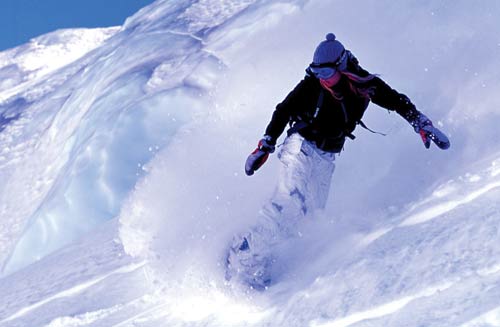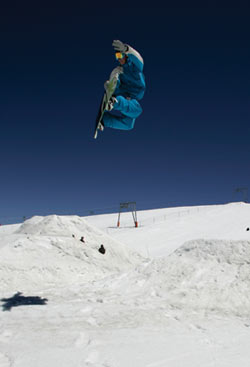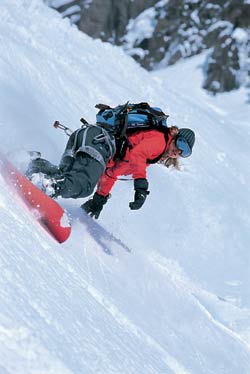Words by Charlotte Davies
Photos by Mike Weyerhauser
Play Clean
The ocean, mountains and green spaces are our playgrounds. They’re where we ride, climb, bike, run, love and live. They magic up waves, powder, rock faces, forests and ice at which we hurl ourselves with delightful abandon, time and time again.
But with reckless abandon, the human race has also been busy trashing its playground. Global warming and pollution have become headline news and loom permanently on the horizon like big black clouds.
So should you throw down your kit in despair? Will a day come when your future kids look at pictures of you pulling off 360s in pure powder or swimming in clean ocean waters as though you’re from outer space?
It’s difficult to separate the facts from fiction and figure out just what kind of fate is in store for our favourite spots. The one thing we know for sure is that we will all have to adapt.
Encouragingly, there are more and more people and organisations fighting back in order to safeguard the future of our environment and as both consumer and outdoors junkie, there’s plenty you can do to make sure you play clean and green.

The Facts of Life
‘You are always more aware of the environment if you are doing sports like surfing or snowboarding,’ says Elissa Koskinen, Hossegor resident and member of the Girlie Camps team. ‘You spend so much time in the ocean and the mountains, so unlike someone just working on their tan and sitting on the beach, you get a lot more concerned about all this stuff.’
There’s no disputing our planet is warming up. A conservative estimate, by the Intergovernmental Panel on Climate Change (IPCC), is that temperatures will increase by 1.5 degrees centigrade this century, but some experts argue it could be by as much as 6 degrees, a rise which would mean whole coastal areas and islands wiped out and see our weather go shaken up.
You certainly get the impression that mother earth is protesting loudly. Recent years have seen an increase in hurricanes, floods, droughts, earthquakes and tsunamis worldwide, all of which are affecting our natural environments. There’s little doubt among experts that the human race is increasingly to blame. The Intergovernmental panel on climate change states that ‘most of the warming observed over the last 50 years is attributable to human activities’.
‘The evidence that, since the 1980s, the impact of man has taken a lead in impacting warming, is overwhelming,’ says Professor Dr Werner Schutz, who heads up the Davos Observatory and World Radiation Centre.
The warning bells are ringing loudly. Our local beaches, mountains, parks and forests are feeling the effect of global warming…and our dirty habits. Increasing levels of travel, goods transportation and other emissions are pouring more fumes into the air and temperature changes are tinkering with delicate eco-balances, affecting green spaces and wildlife.
‘Litter left on beaches really irritates me, especially if it’s plastic or glass bottles or beer cans,’ says Candice O’Donnell, Newquay resident and Roxy longboarder. ‘Plastic bottles take 450 years to break down in a beach environment. Rubbish kills wildlife – animals and birds can get entangled, suffocate or even die because they’ve eaten rubbish. I realise we can’t have a pristine environment but I would like people to be responsible for their own rubbish.’
Ocean Deep, Mountain High
Mountains and oceans are the “edges” of our world. They also act as environmental sentries, sending out warning signs if things are going wrong. What binds them together? Water of course. From the snow, which nourishes and holds together mountain ranges, to the waters running in rivers down to our oceans, all sustaining huge eco-systems.
Water, in all its forms, is under threat. ‘The snow seasons are getting shorter,’ states Sonia Wipf from the Swiss Federal Institute for Snow and Avalanche Research (SLF). ‘And, since 1975, maximum snow depths have decreased by 40cm and spring temperatures are rising by 0.9 degrees centigrade per decade’. The result? More avalanches and rock falls due to more extreme weather and an unstable snow base.
It’s also getting more scarce. Water shortages are more frequent, with mountainous countries like Austria and Switzerland putting into place major water conservation programmes.
Our H2O is getting dirtier too. Surfers Against Sewage (SAS) claims that the equivalent of 80 Olympic swimming pools worth of sewage is deposited every day into the sea in front of Brighton, UK. Mountain areas – ski resorts, forests, lakes and national parks – are also susceptible to pollution due to a combination of narrow valleys and thermal inversions, which act together to trap smoke.
In Austria, where restrictions on trucks travelling through the Bremner Pass were lifted a few years ago, the effect is striking, as Stuart Knowles, a long-time Innsbruck resident and one of the founders of Himaya (makers of sunscreen for outdoor enthusiasts) testifies. ‘Ten years ago the valley was crystal clear,’ he says. ‘Now there is a permanent brown tinge of smog and cases of bronchitis and asthma have increased greatly at the local hospitals’.
In the Chamonix valley, protests against the thousands of trucks that pass through the Mont Blanc tunnel every day have been going on for years, but they’re still rumbling through in huge numbers.
Clouds and Silver Linings

No more snow at low altitude, more avalanches, more rockfalls… in 30 years, your time in the mountains could be radically different. Experts predict that there will be far less glacier to ski on and some of your favourite resorts (Kitbuhel, Gstaad, Morzine and Megeve are all below 1,100 metres) could be heading for wind-down.
According to a report by the United Nations Environmental Programme (UNEP), in three decades the snowline in the Alps will rise by 300m. Terrifyingly, it estimates that 50 per cent of all resorts in Europe may have to close in the next 50 years. Melting snow will trigger more avalanches, landslips and floods as we lose permafrost (the base snow layer that provides stability). What terrain there is left to ride, will have to be crammed into a shorter time as the seasons shorten.
The same report states that if action is not taken to adapt to rises in sea levels, wetlands and lowlands will be displaced, shorelines eroded and there will be far more storm flooding. This will affect some of our beaches and impact on water quality. ‘There will more intense rainfall in summer and winter,’ says Richard Hardy, Campaigns Director of SAS. ‘We are concerned that sewage treatment works won’t be able to cope with this and are challenging government to put climate change at the top of the agenda for water treatment’.
Worldwide, surfing and diving spots are in danger from more extreme weather (the 2004 tsunami disaster was the largest on record) and pollution from oil spills and sewage.
As long ago as 2000, Greenpeace released a study, which predicted that the Pacific Ocean could lose the majority of its coral reefs by the end of the century due to global warming, which would devastate the region’s fishing and tourism industries.
But, it’s not all doom and gloom. Climate change could also mean more snow at higher altitude and open up new areas to skiing (although we’d rather you hiked up than campaign for yet more high-altitude resorts).
The buzzword will be adaptability, which can’t be a bad thing. You’ll have to get sharper and work harder for your kicks; maybe snowshoeing for powder when it strikes unexpectedly in areas that have closed down their lifts. With resorts adapting too, your time in the mountains could finally be due a clean-up. Eco tourism is growing fast and recycling and reduced energy usage is becoming de rigueur as more governments, businesses and even ski resorts (not known for their cleanliness) adopt more sustainable practices.
Some 71 ski resorts in the US have signed a letter backing a climate change bill and many now use bio-diesel fuel in piste-bashers, solar panels for heating and hydro-electricity and wind energy for power. Some regions benefit from existing regulation, which restricts overdevelopment. For example, surf meccas Biarritz and Hossegor are located on fragile marshland, which demands a balanced approach to development. In Sardinia (a mecca for climbers and windsurfers), strict building regulations and an emphasis on using local building materials has meant a more minimal tourist impact.
Snow Facts
- * 1990: NO snow in the French Alps between the beginning of December and the end of January below 1,700 to 2,000 metres.
- * 1999: Massive snowfall in February (described by some as a 500 year event), causing huge avalanches. One in the Chamonix valley killed 12 people in their beds.
- * 2005/6: Bumper snowfall in European Alps, Canada and the US. The highest number of avalanche deaths in the French Alps for 20 years (54 by the beginning of April).
- * In the European Alps, around 50 per cent of the original glacier ice volume has been lost since 1850, according to the IPCC.
Water Facts
- * The Pacific is getting warmer and more acidic as it absorbs more carbon dioxide. At the same time, oxygen and resources for building plankton are diminishing.
- * In the UK over 300 million gallons of sewage (either untreated or only undergone minimal treatment) are discharged to sea each day, say SAS.
- * In 1991, a survey published in the British Medical Journal, showed that surfers were 80 per cent more at risk of becoming ill (illnesses range from hepatitis to fevers) by entering the water than those who stayed on the beach.
- * By 2020, the average water supply per person worldwide is expected be a third smaller than now, according to the UN.
Fighting Back
The environment is no longer just a concern for tree-hugging eco warriors, it is a mainstream political and social issue. There are climate change acts, anti-pollution legislation, new technology and investment in the sustainable manufacturing of everything from shampoo to cars.
However, it’s also a constant battle to maintain momentum, as cash still comes first. So on the one hand you have the Alpine Convention (signed by eight Alpine States and the EU), which aims to preserve and protect the European Alps by pressing for new legislation and co-operation, by banning the construction of any more road tunnels for example. But on the other, there is a powerful lobby of developers pushing for new high-altitude resorts.
Just as well there’s plenty of hardened campaigners out there who are used to overcoming endless obstacles to get things changed. With the environment shooting up the political agenda, organisations and companies that have been campaigning for years, like Surfers Against Sewage (SAS) and Patagonia, are gaining more attention.
Endless lobbying has seen some encouraging results. Richard Hardy from SAS, which campaigns for cleaner waters in the UK and a range of other environmental measures, including more use of renewable energy, jokes: ‘Some companies have seen the UV light’ (treating sewage with UV light is an ultra effective method of making it clean). ‘There’s been £1 billion spent on upgrading sewage treatment works between 2000 and 2005 in the UK,’ he says. SAS has close ties with The Surfrider Foundation, present in France, the US, Australia, Japan and Brazil and which campaigns on similar issues.
Companies like Patagonia, which have worked hard to implement sustainable business practices and place the environment high on their agenda, have also had a lot of success. Patagonia started off its Conservation Alliance in 1989, which consists of 70 members contributing to a central fund ($320,000 in the past financial year) that is allocated to grassroots environmental groups working to protect threatened wildlands and biodiversity.
For others, like the Ski Club of Great Britain, the environment has become an important new issue. Its Respect the Mountain campaign raises money for tree-planting, funds environmental research on the Alps and educates members about the effect of skiing on the environment: ‘Climate change is a reality and ski resorts could be affected,’ explains the club’s Betony Garner. ‘So there’s a selfish motive as well – we want to be able to ski in the future.’
Some brands have been slow in coming forward, but others are embracing eco-initiatives. Quiksilver, for example, launched its Quiksilver Initiative in 1999, aimed at making the company and its customer more environmentally. It’s also developing a range of clothes made from organic cotton and firmly believes that Eurosima (the Surfing Maufacturers’ Association) could unite environmental efforts across the industry. It has now become the norm for surf companies, Quiksilver included, to support grassroots charities like the Surfrider Foundation.
Do Your Bit

The changes our world faces are daunting. But just as the only way we get better at our sports is to work at it little by little, we need to take a similar approach to being ‘greener’. It’s no good saying what difference can I make? Individual actions count. And think how much pleasure you’ll get in the beautiful outdoors if you know you are doing your bit to help save it.
Tatjana Carolin-Bruss, owner of Chicas boardwearshop in Munich and a keen snowboarder sums it up, “ Most of the so-called ‘alternative sports’ we love and cherish, completely depend on the environment. Snowboarding is dependent on the physical facilities on the mountain which bring along a high energy use. This of course leads to environmental problems. But on the other hand, I could not do without snowboarding. So I try to at least do my best and share cars, do not throw away rubbish, pick up the rubbish that I see, and do not snowboard in protected woods”.
Here are some easy steps YOU can take. What are you waiting for?
- * Think about your own use of transport to your favourite spots. Can you take the train instead? Car-share? Cycle? If you do need to drive, join a carbon offsetting scheme, which fund projects like tree-planting. Check out www.climatecare.org or www.carbonneutral.com.
- * Going on holiday? Do some research and opt for eco-type resorts and holiday companies, which are actively minimising their environmental impact. Check out The Ethical Travel Guide (£12.99, Earthscan), the Lonely Planet’s new to eco travel guide Code Green, and websites www.ecoescapes.co.uk and www.responsibletravel.com for inspiration and tips.
- * From petitions to beach cleaning, get campaigning and volunteering. Help support environmental organisations like SAS (www.sas.org.uk), The Surfrider Foundation (www.surfrider-europe.org) and Greenpeace (www.greenpeace.org), which are fighting for a cleaner world.
- * Get writing! Every email or letter to politicians objecting to dodgy environmental policies or weak legislation can help influence them for the better.
- * Support eco-friendly brands for fashion and outdoor kit.
The Green Teams
Patagonia:

Leading the way Founded by Yvon Chouinard, California-based Patagonia has been going for more than 30 years and consistently led the way in sustainable business practices, way before the environment became “fashionable”. From making fleeces out of recycled plastic soda bottles, to donating 10 per cent of pre-tax profits to environmental causes, Patagonia has shown it’s possible to grow into a major global company, without sacrificing principles.
Check out the story and ethos of Patagonia in a fascinating book by its founder, Let my people go surfing – the education of a reluctant businessman (www.patagonia.com).
Howies:

Founded by partners David and Clare Hieatt, Howies is a quirky outdoor clothing company based in South Wales. The brand has won awards for the quality of its gear and built up a great brand by word of mouth. Howies uses organic cotton and denim and is an active campaigner on a number of environmental issues.
‘It shouldn’t be a question of businesses being singled out as “ethical” or “sustainable”,’ says David. ‘It should be a normal way of running a business. Abnormal is to run a company that pollutes everything you touch.’ www.howies.co.uk
Ciel:

Hip new brand Hip designer range, loved by the likes of Sienna Miller. Produced from eco-friendly luxurious materials and made in factories, certified by fair labour standards body.
www.labourbehindthelabel.com or www.ciel.ltd.uk
American Apparel: sexy sportswear Online store selling clean-line sexy sports-based wear. Founded on “vertical integration” (everything is made under one roof and the company provides excellent working conditions for all workers, avoiding sweatshops). Has also started to introduce items made from organic cotton.

